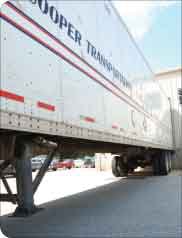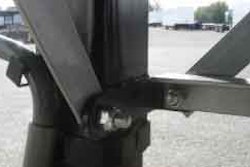Most carriers unranked in CSA
Only 12 percent of active motor carriers are ranked in any of the five safety categories within the new Safety Measurement System the Federal Motor Carrier Safety Administration made public Dec. 12, according to an analysis by Overdrive’s sister publication, Commercial Carrier Journal.
The SMS, which replaced SafeStat, is a key component of FMCSA’s Compliance, Safety, Accountability (CSA) program, formerly known as Comprehensive Safety Analysis 2010.
 To search the newly available carrier data, visit the FMCSA site (http://ai.fmcsa.dot.gov/sms) and select “Advanced search.”
To search the newly available carrier data, visit the FMCSA site (http://ai.fmcsa.dot.gov/sms) and select “Advanced search.”The agency published SMS data and metrics after a federal appeals court on Dec. 10 turned down an emergency request for a stay by three organizations alleging that CSA would have disastrous consequences for many trucking companies.
The majority of carriers, including owner-operators with their own operating authority, are unranked in CSA because FMCSA set minimum thresholds of inspections to be considered within the seven Behavior Analysis and Safety Improvement Categories (BASICs). Those floors vary, but generally carriers must have three to five inspections in the past 24 months to be ranked in a BASIC. FMCSA plans to use those rankings to target interventions, which start with warning letters and can escalate to full-blown compliance reviews.

CCJ’s analysis of data published at FMCSA’s Analysis & Information website shows only 92,184 of the 758,682 active motor carriers in the database are ranked in any of the five publicly available basics – Unsafe Driving, Fatigued Driving, Driver Fitness, Controlled Substances and Vehicle Maintenance. The Cargo-Related and Crash Indicator basics are, for now, withheld from the public due to agency concerns the data could be misleading.
Of the 92,184 carriers that are ranked in at least one BASIC, 52,967 have at least one alert, meaning they exceeded the threshold for intervention. The greatest number of alerts, 29,207, is in the Fatigued Driving BASIC, followed by the Vehicle Maintenance BASIC at 21,791. The Controlled Substances BASIC had the fewest alerts at 3,605.
On Nov. 29, three associations representing motor carriers asked the appeals court to block implementation of CSA or at least public release of certain CSA data until the agency completed a full rulemaking. The groups argued that due to fears over crash liability, shippers and brokers likely would stop using carriers that had alerts in the SMS.
FMCSA told the U.S. Court of Appeals for the District of Columbia Circuit that fundamentally the SMS data to be made public is no different than SafeStat data that has been public for more than a decade.
Although FMCSA now can publish data from the new SMS, the litigation is not necessarily over. In a separate order, the appeals court established a briefing schedule for the lawsuit. Initial briefs will be due Feb. 7, and FMCSA’s response is due March 9.
– Avery Vise
SHORT HAULS
TRUCKING COMPANIES added 1,400 new employees on a seasonally adjusted basis in November, according to preliminary figures from the U.S. Department of Labor. Trucking jobs also grew on a year-over-over basis for the second month in row. Until October, trucking employment levels had not been higher than in the same month the previous year since June 2007. Since the beginning of March, trucking companies have added 17,300 jobs.
DIESEL PRICES will be higher in 2011 if U.S. Department of Energy’s Energy Information Administration forecasts are accurate. The bureau projects diesel to average $3.14 a gallon for the 2010-2011 winter and $3.23 a gallon throughout 2011. As of early December, diesel averaged $2.98 in 2010, compared with $2.46 in 2009.
SURFACE TRANSPORTATION trade between the United States and Canada and Mexico was 19 percent higher in September 2010 than in September 2009, reaching $68 billion, according to the Bureau of Transportation Statistics of the U.S. Department of Transportation. BTS reported the value of U.S. surface transportation trade with Canada and Mexico rose 0.5 percent in September from August.
Execs favor heavier trucks
Infrastructure upgrades and use of heavier trucks can help meet freight demands worldwide, trucking executives said Dec. 1 at a Washington D.C. meeting hosted by Volvo Trucks North America and the American Trucking Associations.
“One strategy that should be well understood and considered is the ability to use more productive trucks as part of the transportation mix,” said Ron Huibers, a senior vice president for Volvo Trucks North America. Huibers said potential solutions include use of heavier trucks and developing truck-only lanes.
Citing increased highway congestion, tougher truck emissions standards and the likelihood of spikes in diesel prices, John Runyan, executive director of the Coalition for Transportation and Production, outlined a plan to reform vehicle weight limits. The Safe and Efficient Transportation Act, a bill in front of the House Ways and Means Committee, would grant individual states the right to adopt 97,000-pound six-axle trucks. If passed, the legislation would allow a 17 percent increase in ton-miles per gallon compared to conventional 80,000-pound trucks and save 2 billion gallons of diesel fuel annually, said Runyan.
Another challenge, said John Woodrooffe, of the University of Michigan’s Transportation Research Institute, is developing sustainable productivity – moving as much freight as possible per truck more safely while limiting infrastructure consumption. One option is the use of long combination vehicles, essentially two 53-foot trailers per power unit, benefits of which would include productivity gains of up to 44 percent, improved safety, reduced fuel consumption and emissions, and lower shipper costs, Woodrooffe said.
– Jeff Crissey
FMCSA proposes new hours rule
Under a proposal from the Federal Motor Carrier Safety Administration, truck drivers couldn’t drive more than seven hours without a break, would have to rest for at least one hour during their 14-hour driving window and could reset their weekly on-duty limits only with a 34-hour restart that includes two nighttime periods.
 The agency proposes that drivers take a break of at least 30 minutes before driving more than seven hours straight. No change in the sleeper berth limits was proposed.
The agency proposes that drivers take a break of at least 30 minutes before driving more than seven hours straight. No change in the sleeper berth limits was proposed.FMCSA released the notice of proposed rulemaking to modify hours-of-service regulations on Dec. 23, as Overdrive was going to press. The NPRM was expected to be published in the Dec. 29 Federal Register, activating a 60-day comment period. A copy of the NPRM is available at fmcsa.dot.gov.
The NPRM follows the 2009 settlement of a lawsuit filed by safety advocacy groups over the current hours rule. Under that settlement, FMCSA is obligated to issue a final rule by July 26, 2011.
One big question had been whether FMCSA would reduce the number of driving hours allowed between off-duty periods from the current 11 to 10. The agency says it will settle the question following public comment, adding that it leans toward a 10-hour limit.
Regardless, FMCSA’s proposal would place new restrictions on drivers’ workdays. Under the current rules, drivers can conduct nondriving work after the 14-hour window for driving time. FMCSA now proposes to require that drivers’ workdays end immediately following the 14-hour window and that there can be no more than 13 hours on-duty during that window. Put more simply, drivers would have to take at least one hour off-duty during their driving shifts.
In addition, FMCSA proposes to require that drivers take a break of at least 30 minutes before driving more than seven hours straight. That 30 minutes would be part of the mandatory one-hour off duty.
Another concern in the industry was whether FMCSA would change the requirements for restarting cumulative on-duty time. The limits are now 60 hours in seven days or 70 hours in eight days following a 34-hour rest.
The agency proposed to leave the restart at 34 hours but with a significant restriction: Restarts would have to include two periods of midnight to 6 a.m. In addition, drivers would be explicitly limited to a single restart in a seven-day period.
FMCSA left in place the strict limits on use of the sleeper berth that the agency adopted in 2005.
Todd Spencer, executive vice president of the owner-operator Independent Drivers Association, says the group is analyzing the proposal. “To make additional safety gains, the next hours-of-service rule must be more flexible to allow drivers to sleep when tired and to work when rested,” he says. “The rules must encourage truck drivers to get off the road when they are tired and must not penalize them for doing so.”
Bill Graves, president and CEO of the American Trucking Associations, says the proposal is “overly complex, chock full of unnecessary restrictions on professional truck drivers and, at its core, would substantially reduce trucking’s productivity.”
– Avery Vise
SHORT HAULS
OCTOBER’S Freight Transportation Services Index increased 0.2 percent from its September level and 10.2 percent over October 2009, the U.S. Department of Transportation’s Bureau of Transportation Statistics said. BTS reported the Freight TSI has risen 5.7 percent over the last 17 months, after declining 15.3 percent in the previous 10 months. The index has increased in 13 of the past 17 months.
CLASS 8 TRUCK orders for major North American truck makers in November totaled 26,005 units, a 38 percent increase over October and the highest monthly order level since May 2006, FTR Associates said. November marked the fourth consecutive month-over-month increase in orders.
NEW ORDERS of dry van trailers more than doubled in October from the prior year, leading total net orders of commercial trailers to a 33-month high, according to ACT Research Co. Eight of nine trailer categories tracked by the company increased year-over-year.
Arrow Trucking ex-employee paychecks OK’d
Almost a year after Arrow Trucking’s closure, a bankruptcy trustee requested court approval to pay more than $1.97 million in priority wage claims to former employees.
In November, Trustee Patrick J. Malloy III proposed distribution of $2 million to a 16-page list of former employees. After removing duplicate or inadvertent entries, he filed an amended proposal for a lesser amount Dec. 2, according to the U.S. Bankruptcy Court for the Northern District of Oklahoma.
The Tulsa World newspaper reported Judge Dana Rasure approved the amended distribution Dec. 8.
Malloy’s Dec. 2 pleading also requested $105,262 in trustee fees, for a total interim distribution of nearly $2.8 million. That payout, together with court-approved administrative claims, will leave more than $1.52 million for future administrative claims, additional payments to priority wage claimants filed and those yet to be filed.
The court had ordered that New Jersey attorney Charles Ercole is entitled to one-third of the distribution paid to 232 former employees he represented. Ercole’s clients will receive their payments, less income tax withholdings and Ercole’s fees.
The Tulsa-based flatbed carrier petitioned for Chapter 7 bankruptcy Jan. 8, 2010, while faced with lawsuits from unpaid employees and creditors. The consolidated bankruptcy includes Arrow Truck Leasing and Arrow Truck Real Estate companies.
The company abruptly closed Dec. 21, 2009, leaving a recorded phone message telling drivers to drop off trucks at dealerships.
– Jill Dunn
SHORT HAULS
DESPITE PROTESTS by truckers, New York has closed the last four of the six rest stops slated for temporary closure to cope with budget cuts. The rest areas on I-87 and on I-88 closed Dec. 2. Previously, rest areas on I-81 and I-90 were closed. Opponents have expressed concern that DOT will not reopen the locations in 17 months as planned.
A NEW YORK law authorizes trucks equipped with auxiliary power units to weigh up to an additional 400 pounds. According to the U.S. Department of Energy, 25 states have laws that permit the weight exemption.
Survey: Carriers optimistic
Two-thirds of carriers expect freight volumes to increase this year, according to Transport Capital Partners’ Business Expectation Survey for the fourth quarter of 2010.
 The rate increases experienced by large carriers in late 2010 were bigger than those seen by small carriers, according to TCP’s survey.
The rate increases experienced by large carriers in late 2010 were bigger than those seen by small carriers, according to TCP’s survey.Last year, about the same share of carriers expected volumes to increase, but a peak of almost 90 percent was hit in the second quarter of 2010. Richard Mikes, TCP partner, says the hopefulness that characterized the spring has waned in recent quarters as economic growth has slowed.
Still, this was the second-highest level in two years, and with over three-quarters of carriers expecting rate increases in the next year, optimism remains high.
Mikes says shippers will be hard-pressed not to accommodate cost pressures coupled with the restricted supply of trucks and drivers that is likely to continue.
Mikes says larger carriers are more upbeat in this environment. “More of the carriers over $25 million in revenue saw rates go up in the last three months than did the smaller carriers,” which also was reflected in future rate expectations, according to the survey. However, Batts says smaller carriers are facing increasing fuel, equipment and financing constraints, and must recover more costs soon.
– Staff reports
HIGHWAY HAPPENINGS
DELAWARE. The state is scheduled to begin enforcing its ban on texting while driving on Jan. 2. The state is one of eight that prohibit all cell phone use except hands-free behind the wheel. Use of laptop computers and personal digital assistants while driving is also banned.
GEORGIA. Expect periodic delays as the state widens State Route 324 crossing over I-85. The project is scheduled to be completed in 2012.
IDAHO. A task force has made several recommendations to raise funds for new highways and repairs in the state, including a fuel tax increase and tying the tax to the rate of inflation. Other options include higher truck registration fees and reviving a weight-distance tax.
MICHIGAN. The state will keep all but seven of its 81 rest areas open for the winter season through April 4. Three of the closed rest areas are located on I-75. Two closed facilities on I-96 are under construction and one is scheduled to reopen in April and the other in July.
MINNESOTA. Allowable winter load limits on several state highways have been increased. Vehicles will be allowed to carry up to 10 percent more weight than standard legal loads on unrestricted highways during the winter. A permit is required to take advantage of the weight increase on interstates.
SOUTH CAROLINA. A bill filed for the upcoming legislative session would allow the state to seek private partners to complete the proposed Interstate 73 project. The road would go from Myrtle Beach to the northern part of the state and link up with I-95. The bill would also allow tolling authority for new projects and add lanes to existing highways.
TENNESSEE. On Jan. 3, the state will close the Henley Bridge in Knoxville for 24 to 30 months for extensive rehabilitation. The closure will utilize the James White Parkway and Sevierville Pike as a detour. Bridge reopening is scheduled for 2013.
WISCONSIN. The state is the latest to ban texting while driving. The law makes violations a primary offense, meaning drivers can be stopped solely for texting. A federal rule banning texting while operating a commercial vehicle began in October.
Court sets date for trucker spy
A man hired by carriers to report unsafe truckers faces charges of attempted first-degree murder, aggravated assault and reckless endangerment in a Tennessee court Feb. 17.
Joseph John Volpe, 44, of Chickamauga, Ga., was booked June 30 into Hamilton County Jail on the assault and endangerment charges. A county grand jury indicted him on the two charges Nov. 17 and added and indicted him on the third charge, according to county records.
Volpe’s attorney Sam Robinson said Volpe was videotaping trucker Joseph Johnston on Interstate 24 on June 30. Johnston tried to run Volpe off the road, according to a Dec. 10 WTVC-TV News Channel 9 story.
The arrest affidavit does not describe Johnston’s actions, but states Volpe fired a gun at Johnston’s truck, the station reported.
The Georgia Secretary of State does not have a listing for Volpe’s business, Third Eye Highway Safety, or have Volpe listed as an officer in that company.
— Jill Dunn
Critics seek to remove tiger from truck stop
Wildlife advocacy groups are urging Louisiana officials to oust the state’s last privately owned big cat from its Tiger Truck Stop home.
Tiger President Michael Sandlin’s permit to house the 10-year-old Bengal-Siberian mix at his Baton Rouge area truck stop was to expire Dec. 31, said Commissioner Bo Boehringer, of the Louisiana Wildlife and Fisheries Commission.
A request for renewal had not been received by early December. But if it is received, the commission would make an on-site visit. The applicant would then be informed by letter of the commission’s decision, which, if approved, is good for one year.
The Wild Animal Sanctuary and other wildlife advocates have been petitioning Louisiana officials to remove the animal and publicized the board would meet in regular session Dec. 2. But permit decisions are not made at board meetings, Boehringer said.
Louisiana bans private ownership of big cats, except for four owners grandfathered in on Aug. 15, 2006. But after the law was passed, only Sandlin remained as a big cat owner, he said.
The business’ website, www.tigertruckstop.com has posted statements disagreeing with charges made by wildlife protection groups that Tony’s living conditions are hazardous to him and a safety risk to the public.
– Jill Dunn
Decision coming on N.Y.-N.J. port stickers
The Federal Motor Carrier Safety Administration has been asked to determine if federal law pre-empts the Port Authority of New York and New Jersey from requiring trucks to have the port’s registry stickers before entering.
In a Notice of Petition for Determination, the agency said it would accept comment on the matter until Jan. 3 and reply to comments until Jan. 18.
The port authority stipulated trucks entering its facilities display stickers indicating compliance with its new Drayage Truck Registry. The New Jersey Motor Truck Association asked the Secretary of Transportation if federal law pre-empted this rule.
The port then amended its tariff to clarify the stickers are voluntary and trucks would not be denied access for lacking stickers, effective Oct. 15.
But the association said it would not be voluntary and broadened its request to ask DOT determine if substantive DTR provisions are preempted by federal law.
The 2005 omnibus transportation funding authorization prohibits states from requiring motor carriers to display identification, unless required by the Secretary of Transportation. However, if determined appropriate, the secretary may make an exception to this.
The port’s Clean Truck Program requires DTR registration and phases out the most polluting trucks first, beginning Jan. 1.
– Jill Dunn
Greatwide driver saves brothers
Two brothers are alive because of the actions of Antonio Cooper, a driver with the Oklahoma City operating center of Greatwide Logistics Services, Dallas. The Truckload Carriers Association named Cooper a Highway Angel.
On Oct. 8, Cooper was driving on Highway 152 in Oklahoma City. He saw the car in front of him weaving back and forth across the lanes and into and out of the median. Pulling alongside the car, he honked, which woke up the sleeping passenger. The passenger grabbed the steering wheel and managed to stop the car in the median.
The driver, 18, had been having a seizure and seemed incoherent. Cooper called 911 and held the driver’s tongue back so he wouldn’t choke. Cooper called the mother of the driver and passenger, who are brothers. When paramedics arrived, he helped restrain the young driver who was seizing.
“If I can save a life, spare a life, that’s what I’m here for,” said Cooper. He added that the incident seemed oddly familiar to him because while driving in Florida in 2006, he had also stopped to help a driver suffering a seizure.
– Staff reports
Techs win thousands of dollars at Rush Rodeo
Chris Zweifel is the 2010 Rush Tech Skills Rodeo heavy duty grand champion of the two-day contest held in Rush Truck Center in San Antonio, Texas, Dec. 13-14.
Zweifel has worked for a decade with the Rush El Paso, Texas, Peterbilt store, following a career in maintenance in the U.S. Army.
San Antonio-based Rush technician Matthew Pogue won the medium-duty crown. Between them, they bagged cash and prizes valued at $38,000, including an all-expenses-paid trip for each technician and a spouse to the Grand Cayman Islands, among other prizes.
The 2010 competition was the fifth for Rush Enterprises, owner of the largest network of Peterbilt dealers in the United States, as well as several International dealerships integrated under the Rush Truck Centers brand.
Technicians were scored on proper procedure, time and repair success by manufacturer representatives.
— Todd Dills
Rush Tech Skills Rodeo Results
Heavy Duty
• Grand Champion ($5,000) Chris Zweifel,
El Paso, Texas
• Reserve Grand Champion ($2,500)
Jason Morris, Flagstaff, Ariz.
• Third ($1,000) Erick Lincoln, Albuquerque, N.M.
Caterpillar
• First ($5,000) Erick Lincoln, Albuquerque, N.M.
• Second ($4,000) Chris Zweifel, El Paso, Texas
• Third ($3,000) Jason Morris, Flagstaff, Ariz.
Cummins
• First ($5,000) James Collins, Ft. Worth, Texas
• Second ($4,000) Ted Mazurkiewicz,
Pico Rivera, Calif.
• Third ($3,000) Shawn Thornton, Alice, Texas
Eaton
• First ($5,000) Brian Noska, Sealy, Texas
• Second ($4,000) Jason Swann, Dallas
• Third ($3,000) Chris Jensen, Houston
Medium Duty
• Grand Champion ($5,000) Matthew Pogue,
San Antonio, Texas
• Reserve Grand Champion ($2,500)
James Glover, Houston
• Third ($1,000) Erick Lincoln, Albuquerque, N.M.
Medium Duty first stage
• First ($5,000) Matthew Pogue,
San Antonio, Texas
• Second ($4,000) Gabriel Benavides,
Fontana, Calif.
• Third ($3,000) James Glover, Houston
Refuse
• First ($5,000) Alan Phillips, Pico Rivera, Calif.
• Second ($4,000) Nathan Buffington, Phoenix
• Third ($3,000) Travis Webster, Houston
FMCSA seeks handheld cell phone ban
The U.S. Department of Transportation’s Federal Motor Carrier Safety Administration has issued a notice of proposed rulemaking that would prohibit interstate commercial truck and bus drivers from reaching for, dialing or holding handheld cell phones while operating a commercial motor vehicle (CMV) in interstate commerce.
The announcement comes three months after FMCSA issued a final rule banning commercial vehicle drivers from texting while driving.
The proposal would fine drivers up to $2,750 in federal civil penalties for each offense and disqualify their commercial driver’s license for repeat offenses. Additionally, states would suspend a driver’s CDL after two or more violations of any state law on handheld cell phone use. Carriers that allow their drivers to use handheld cell phones while driving would face a maximum penalty of $11,000.
According to research by Virginia Tech Transportation Institute cited by FMCSA, using a handheld cell phone while driving significantly increases the likelihood of an accident or safety-critical event. In particular, reaching for an object while driving triples the crash risk, and dialing a phone number into a handheld phone while driving increases crash risk six times.
While the VTTI study showed increased crash risks for using handheld cell phones while driving, the same research showed that having a conversation on a handheld or hands-free mobile device was a low-risk activity that only requires a driver to look away from the road for a brief period. FMCSA says “it is not clear if simply talking on a mobile telephone presents a significant risk,” and the proposal doesn’t prohibit hands-free phone use while driving, as was recommended to the agency by the National Transportation Safety Board.
A 60-day public comment period will begin once the proposed rule is published in the Federal Register. The proposal and forms to submit comments are at www.fmcsa.dot.gov/, then click on the News Release about the proposal and then click on the Related Links for the Notice of Proposed Rulemaking.
— Jeff Crissey
LA port program adds Class 7 trucks
Los Angeles Harbor Commission on Dec. 16 approved two measures to strengthen its enforcement of the Port of Los Angeles Clean Truck Program that targets emissions.
The commission approved a measure to incorporate Class 7 trucks into the program and a measure to strengthen enforcement against “drayoffs,” a practice that involves switching cargo from a CTP-compliant truck to a noncompliant truck within the Harbor District or adjacent public streets.
– Staff reports n
Bill adds truck weight program
A provision has been added to an omnibus government funding bill that would extend the Maine and Vermont truck weight pilot program for one year.
The provision – secured on Dec. 14 by U.S. Sen. Susan Collins (R-Maine) – would ensure the pilot program will continue giving heavier six-axle trucks full access to interstate highways in Maine and Vermont.
Prior to the pilot program, introduced last year by Sen. Patrick Leahy (D-Vt.) And Collins, commercial vehicles weighing more than 80,000 pounds often were barred from interstate travel and diverted onto state and local roads. The Obama administration and Maine DOT both have supported the permanent extension of the pilot program and have credited it with having improved safety and productivity on Maine and Vermont highways.
“Thanks to Senator Collins, it’s likely that truck transportation in Maine and Vermont will continue to be safe, efficient and productive in the coming year,” said John Runyan, executive director of the Coalition for Transportation Productivity, a group of 180 shippers and allied associations backing increased federal weight limits on interstate highways.
The Senate must now pass the omnibus funding bill and send it back to the U.S. House of Representatives for its approval.
— Staff reports








